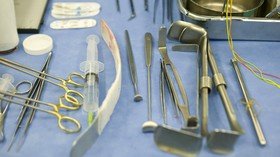Clean cut: Dutch hospitals ditch US body-part distributors over ethics, disease

Hospitals in the Netherlands are dropping US body-part distributors on ethical grounds after a decade of unregulated trade in dissected human limbs.
In the United States, everything has its price, and as the large scale dead-body market shows, this doesn’t end after death. In a Reuters exclusive, two Dutch hospitals revealed that they would be cutting off their business ties to American companies that have been profiting off the sale of human body parts in light of disturbing revelations.
The scrutiny began after Oregon-based MedCure came under suspicion of selling diseased body parts to customers in America and abroad, drawing attention from the FBI. The company has sold tens of thousands of pounds of human parts all over Europe, including numerous severed heads that were purchased by Amsterdam’s Academic Medical Center (AMC) for training and research. No evidence of disease was discovered in these particular shipments, but AMC and another Dutch hospital said they would drop the suppliers over their questionable ethics.
The parts the companies sell are often acquired from macabre deals where families are offered discounts on incredibly expensive funeral arrangements (with an average price-tag of $7,000 to $10,000 dollars in the US) in exchange for allowing companies to dismember and sell pieces of their loved ones’ corpses... yet, most don’t even realize that someone is making money from their 'donation'. According to another Reuters article from 2017, many funeral homes have struck mutually beneficial deals with body-parts distributors – tipping them off on potential donors in exchange for referral fees – to take advantage of a ‘product’ that can easily be obtained for free.
Whereas Dutch law is fairly strict in regard to the transport, sale and use of human organs, the body-part market is essentially a free-for-all, with the health industry claiming that regulations are not needed as the hospitals themselves are trusted to take precautionary measures.
Freek Dikkers, a nose, ears and throat specialist at AMC whose department had purchased heads from MedCure, called the such morbid business strategies “unacceptable.” Reuters reports that the going rate of a human head on the US market is $500 dollars and an entire body can fetch as much as $10,000, although the hospitals themselves declined to comment on how much they had been paying.
MedCure say they are “an accredited and regulated institution and adhere to the best-in-class industry standards for safety ethics, and transparency,” who sells the parts in order to facilitate scientific and medical research.
MedCure is not the first global medical supply company to draw heavy scrutiny for exploiting an unregulated market. The International Consortium of Independent Journalists published a study just this year about American based Medtronic which made millions selling faulty biometric implants linked to thousands of deaths.
If you like this story, share it with a friend!















